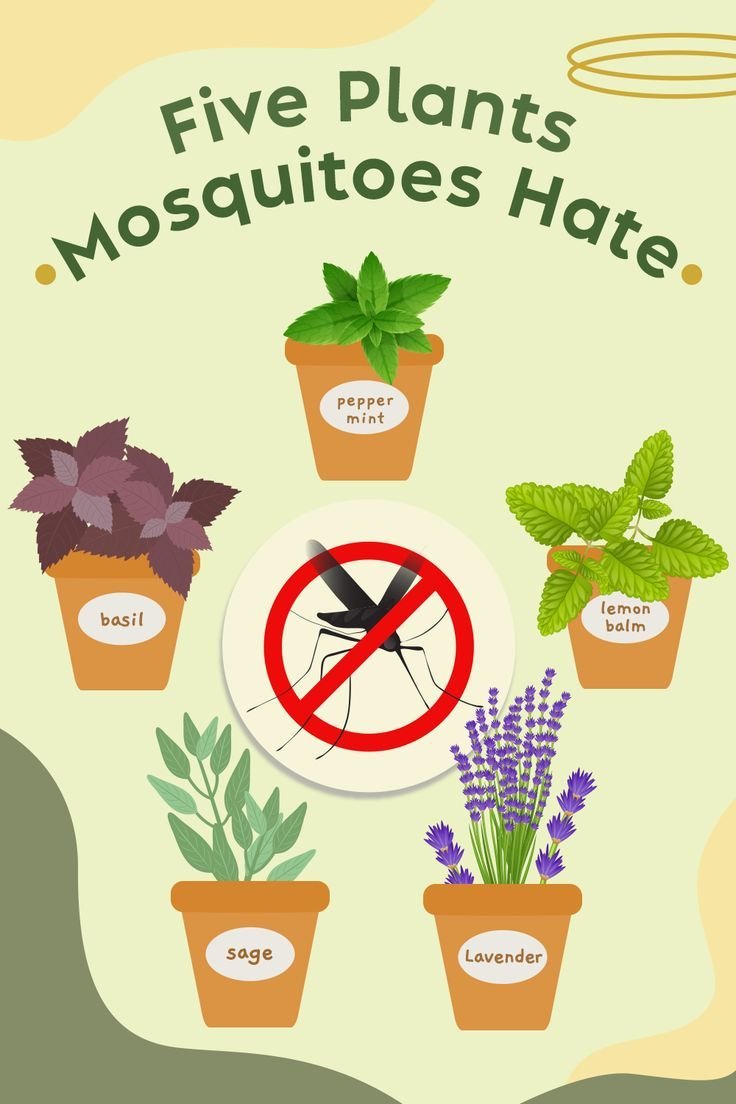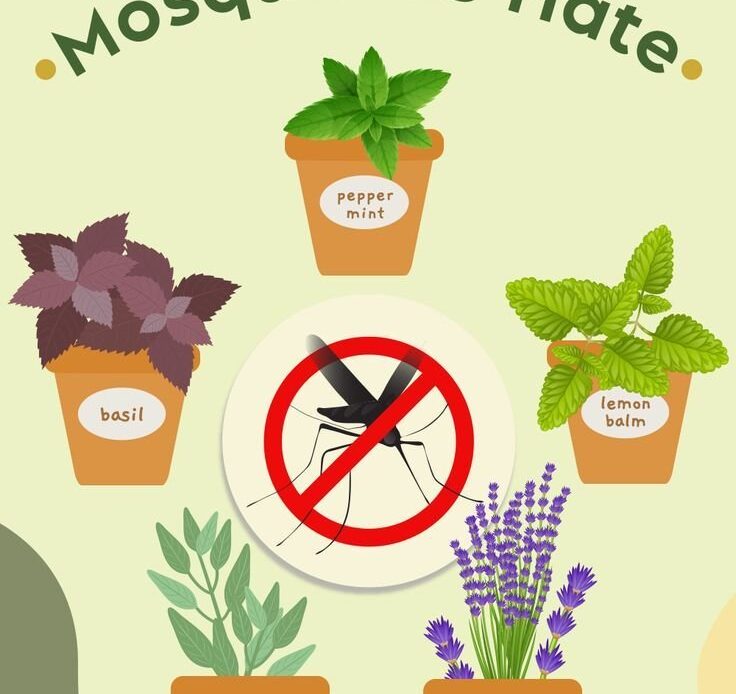Flies are among the most annoying pests that can invade your home, garden, and workspace. They are not only a nuisance but also a potential source of contamination, carrying diseases from one place to another. Whether you’re hosting a gathering in your backyard, trying to enjoy a peaceful moment inside your home, or tending to your garden, the presence of flies can be frustrating. However, there’s good news You don’t need to rely on harmful chemicals to keep flies at bay. Nature provides us with some magical herbs that can act as natural fly repellents. In this article, we will explore the best herbs to keep flies away and how you can use them in your everyday life.

### The Importance of Natural Fly Repellents
Flies are attracted to food, garbage, and even feces, which can lead to hygiene issues in both homes and businesses. While there are many commercial fly repellents available, most of them contain harmful chemicals that can pose risks to your health and the environment. That’s where herbal solutions come into play. These herbs are not only safe for you and your loved ones but also contribute to a more sustainable and eco-friendly way of living. By incorporating these herbs into your home or garden, you can easily discourage flies from settling in, without harming your surroundings.
### 1. **Basil: A Fresh-Scented Fly Repellent**
Basil is widely known for its aromatic leaves, commonly used in culinary dishes around the world. But did you know that this herb can also help you eliminate flies? Basil has a strong fragrance that repels various insects, including flies. Its potent scent can overwhelm their senses, causing them to steer clear of your space.
How to Use Basil for Fly Control:
– **Plant Basil Around Your Home**: If you have a garden, plant basil near your windows, doorways, and outdoor seating areas. The smell will naturally deter flies and other pests.
– **Create a Basil Spray**: You can also make a fly-repellent spray by boiling basil leaves in water, straining the mixture, and spraying it around your home. This is a simple and effective solution to keep flies away.

### 2. **Lavender: A Dual-Purpose Herb**
Lavender is often associated with relaxation due to its soothing scent, but it also has the power to keep flies at bay. The strong aroma of lavender can drive flies away and even repel mosquitoes, making it a versatile herb to have in your arsenal. It is also a great option for those who want to maintain a pleasant, calming fragrance in their home while keeping flies away.
How to Use Lavender for Fly Control:
– **Plant Lavender in Your Garden**: Lavender plants are perfect for attracting beneficial insects like bees, while deterring harmful pests like flies. Place them near your windows or outside your porch to create a fly-free zone.
– **Lavender Oil**: If you prefer an indoor solution, try using lavender essential oil. Simply dilute it with water and spray it in areas where flies are a problem, such as around windows and doorways.

### 3. **Mint: A Refreshing Fly Deterrent**
Mint is another herb that works wonders when it comes to repelling flies. Its strong menthol aroma confuses the sensory systems of flies, preventing them from coming close to areas where it’s present. Mint is also very easy to grow, making it an accessible option for most people.
How to Use Mint for Fly Control:
– **Grow Mint in Pots**: Mint can be grown in containers around your home or garden, especially near entry points like windows, doors, and patios. It will not only keep flies away but also provide a fresh scent to your space.
– **Mint Tea or Spray**: You can brew mint leaves to make a tea or infusion, then use it as a natural fly repellent. The cool, refreshing aroma of mint will help you create a fly-free environment.
### 4. **Rosemary: A Robust Herb with Fly-Fighting Power**
Rosemary is a popular herb in cooking, but it also possesses insect-repelling qualities that make it ideal for keeping flies away. The pungent, woody scent of rosemary can overwhelm the delicate senses of flies, making them avoid areas where rosemary is present. Plus, rosemary is a hardy herb, making it easy to grow in various climates.

How to Use Rosemary for Fly Control:
– **Plant Rosemary Outdoors**: Rosemary thrives in sunny conditions, so plant it in your garden, near windows, and in areas where flies are most likely to enter.
– **Make a Rosemary Spray**: You can also create a rosemary-infused spray by boiling the herb in water and spraying it around the house. This can keep flies from lingering in your space.
### 5. **Thyme: A Fly-Repelling Herb with a Strong Scent**
Thyme is not only a delicious herb commonly used in cooking, but it also acts as an excellent fly repellent. Flies are sensitive to the smell of thyme, and its strong scent can be enough to keep them away. Whether you plant it in your garden or use it indoors, thyme can be a great tool to manage your fly problem.
How to Use Thyme for Fly Control:
– **Plant Thyme Around Your Home**: If you have a garden or even a balcony, planting thyme in strategic locations can help deter flies and other pests from invading your space.
– **Thyme Oil Spray**: You can make a thyme oil spray by mixing a few drops of essential thyme oil with water. Spray it around windows, doors, and other places where flies tend to gather.

### 6. **Citronella: A Fly and Mosquito Repellent**
Citronella is widely recognized for its ability to repel mosquitoes, but it also works wonders against flies. The citrusy scent of citronella is overpowering to flies, making them avoid areas where citronella is present. This herb is a popular choice for outdoor spaces, especially during the warmer months.
How to Use Citronella for Fly Control:
– **Citronella Candles**: Citronella candles are an easy and effective way to keep flies at bay. Simply light them in outdoor spaces like patios and gardens to create a fly-free zone.
– **Plant Citronella**: If you have the space, plant citronella in your garden or pots near your windows to create a natural fly barrier.
### 7. **Bay Leaves: A Natural Fly Repellent**
Bay leaves are often used in cooking to enhance the flavor of dishes, but they also have a strong odor that repels flies. The scent of bay leaves is enough to confuse flies and prevent them from entering your home. Additionally, bay leaves are easy to store and use, making them a convenient option for fly control.
How to Use Bay Leaves for Fly Control:
– **Place Bay Leaves in Key Areas**: Simply place bay leaves in areas where flies tend to gather, such as near windows, doorways, and trash bins.
– **Bay Leaf Oil**: You can also create a natural fly repellent spray by infusing bay leaves in water and using it as a spray around your home.
### 8. **Lemon Balm: A Sweet-Smelling Herb That Drives Away Flies**
Lemon balm is a member of the mint family, and its lemony scent is both refreshing and effective at repelling flies. This herb is not only great for fly control but also attracts pollinators like bees, making it a beneficial addition to your garden.
How to Use Lemon Balm for Fly Control:
– **Plant Lemon Balm in Your Garden**: Lemon balm grows easily in the garden and can be placed near entry points to keep flies at bay.
– **Lemon Balm Tea**: Brew lemon balm leaves in hot water to make a tea and use it as a fly-repellent spray around your home.

### 9. **Lemongrass: A Powerful Fly Deterrent**
Lemongrass has a strong citrus aroma that flies cannot stand. This herb is widely used in cooking and natural medicine, but it also serves as a natural fly repellent. Lemongrass is especially effective when combined with citronella, making it a double threat to flies and other pests.
How to Use Lemongrass for Fly Control:
– **Plant Lemongrass Around Your Property**: Lemongrass is easy to grow and can be planted near windows, doors, and patios to keep flies away.
– **Lemongrass Oil**: Lemongrass essential oil can be used to make a fly-repellent spray that can be applied in areas where flies are most active.
### Conclusion
Flies are a nuisance, but with the right natural solutions, you can keep them at bay without resorting to harmful chemicals. Herbs like basil, lavender, mint, rosemary, thyme, citronella, bay leaves, lemon balm, and lemongrass are not only effective fly repellents but also provide a pleasant aroma to your home and garden. Whether you plant these herbs in your garden, use essential oils, or make homemade sprays, these natural fly deterrents offer a safe, eco-friendly way to protect your living spaces from flies. By incorporating these magical herbs into your routine, you can say goodbye to flies and enjoy a pest-free environment all year long
